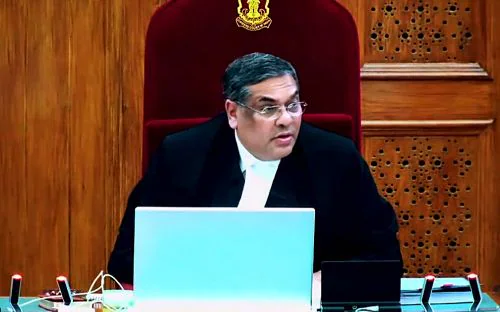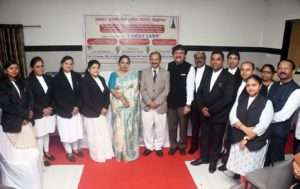
New Delhi: Chief Justice of India D Y Chandrachud has named Justice Sanjiv Khanna as his successor in his letter written to the Union Law Ministry. Justice Khanna is the second-most senior judge of the Supreme Court.
The government had written to the outgoing Chief Justice last week, asking him to send his recommendation as per procedure. DY Chandrachud will retire on November 8 after completing a two-year term.
Upon approval by the government, Justice Khanna will become the 51st Chief Justice of India. He is set to serve a tenure of six months, concluding on May 13, 2025, before his retirement.
Who is Justice Sanjiv Khanna?
A prominent figure in the Indian judiciary, Justice Khanna has made significant contributions since his enrolment as an advocate with the Bar Council of Delhi in 1983. He started his legal career at the Tis Hazari district courts and quickly advanced to the Delhi High Court and various tribunals.
In 2005, Justice Khanna was elevated to the position of additional judge at the Delhi High Court and become a permanent judge the following year. On January 18, 2019, Justice Khanna was elevated to the Supreme Court, making him one of the few judges to achieve this milestone without first serving as Chief Justice of any High Court.
Notable rulings
He allowed former Delhi Chief Minister Arvind Kejriwal to receive interim bail, enabling him to campaign during the Lok Sabha elections. Justice Khanna also played a key role in a critical ruling concerning former Deputy Chief Minister Manish Sisodia. He emphasised that delays in legal proceedings could serve as a valid reason for granting bail under the Prevention of Money Laundering Act (PMLA).
In another significant case, a Justice Khanna-led bench denied a request for 100 percent verification of votes cast on EVMs using Voter Verifiable Paper Audit Trails (VVPATs). The April 2024 judgement recognised the measures implemented by the Election Commission of India to ensure election accuracy and integrity, affirming that EVMs facilitate efficient and secure vote counting.
Justice Khanna was also part of a five-judge bench that recently declared the electoral bond scheme unconstitutional. The bench concluded that anonymous donations through these bonds infringe upon the public’s right to information, which is essential for informed voting.
He also supported upholding of the abrogation of Article 370, stating that while it represented a unique aspect of India’s federal structure, it did not grant sovereignty to Jammu and Kashmir.
After a long stint as the Senior Standing Counsel for the Income Tax (I-T) Department and in 2004, Justice Khanna was appointed the Standing Counsel (Civil) for the National Capital Territory of Delhi.
In 2023, while hearing the case against a journalist’s comments on a TV show, a Bench led by Justice Khanna asserted that Article 19(1)(a) cannot be used to override the fundamental right assured by Article 21. “If one asserts their right to speech, others have the right to listen or not listen,” the bench said and quashed the FIR.
Besides this, Justice Khanna was also part of the Constitution Bench decisions, such as the December 2023 ruling which upheld the abrogation of Article 370 of the Constitution, and the one February 2024 ruling that struck down the government’s 2018 electoral bonds scheme.













